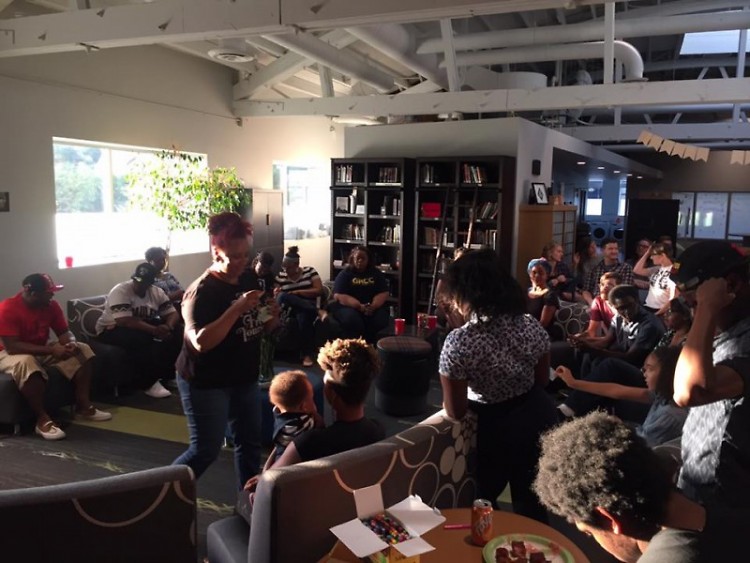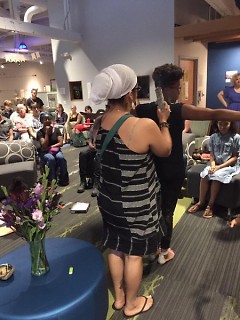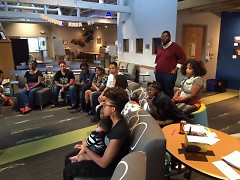This past week has not been easy to say the least.
The murders of Alton Sterling and Philando Castile have once again galvanized the country to speak out, to activate, to demonstrate, to say "Enough is enough." Black lives matter, Black lives matter, Black lives matter.
Meanwhile, I was weary. Filled with all the same feelings of hopelessness, betrayal, rage, sadness and bitterness that all Black people feel when this happens yet again, I also felt burned out and felt isolated. I just did not want to attend or organize another rally. I didn't want to yell or be yelled at. I didn't want to hear "All Lives Matter" or "Blue Lives Matter" or any of the other things people say to belittle Black pain. I didn't want to once again put myself out there when I felt like running away from it all, though I can't.
As an organizer and attender of demonstrations and rallies, I take no issue with them. They are historically integral and salient to the struggles of many marginalized communities and those who say otherwise are grossly misinformed or trying to dismiss the activists and organizers of today. They are how people struggle, resist and win - always have been, always will be.
I just realized that we as Black people don’t get to see or acknowledge each other’s hurt and pain often, let alone have it seen or acknowledged by others. Too often, our issues are so public and deeply entrenched in legislative, judicial and institutional spheres, our pain so played out on political stages, that people forget it is our blood on the streets, our cries that fill the air. To many, we are problems to be solved, not hurt people deserving of respite. To many, we, especially Black women, are still the mules who should shoulder the burdens of this nation and our people on our own, quietly, with nothing betraying that we cannot, should not do so.
So last Thursday morning, I put out a call on my Facebook for people to help create a healing event for the weekend. I wanted it to be co-created and co-lead so that I and other Black folks were not, in our most vulnerable moments, expected to do all the work. It would be open to all but structured in three different parts. White and non-Black people of color standing in solidarity with Black folks would each meet in a different space and talk about how to address and discuss anti-Blackness in their communities and support Black folks. Black folks would talk about how they were feeling, what they wanted to tell each other and themselves, what commitments they'd make to each other to support ourselves better, and what demands we had from our allies.
About 80 people came to the event held at HQ, who graciously offered us the space. Before the event, white organizers brought in food donated by the carload and we set up the space and waited for people to come. By 7:20, we split into three separate groups. The Black healing space followed a loose itinerary created by myself with contributions and support from activist and space co-lead Leslie Mac. We started off by setting intentions of how we planned to hear and support one another in the space and show respect to gender, sexuality and experiences and saying the names of those we lost to state-sanctioned brutality in the past week and all the years beforehand. We expressed all our grief and frustration, our frantic hope and needs, and our wants for justice. We spoke of our children, our parents, our friends, ourselves, because alone, we can only bear and be so much, but together, we are all powerful, our beings infinite. After sharing and discussing, writing letters to ourselves that Leslie would then send through snail-mail, and making more commitments to each other, we created a list of demands that we then read to the non-Black people of color and white people when our groups all met together near the end.
My friend Chasity Moore closed out the space with affirmations and offers to smudge willing participates with sage, a practice done in Indigenous and African communities.
It was an excellent example of how we build, meet, heal, communicate and resist outside of traditional institutions and systems of power that only hurt and divide marginalized communities. It was also a space to talk about the complexities of Black solidarity and healing spaces, as we live in a climate both intra and inter-culturally that erases the experiences of Black women and femmes, queer and trans folk, Black mentally ill and disabled, Black fat folks, and many others from the narrative of police and state violence.
I believe strongly in Black-centered movement and Black-centered healing. I believe that Black people are introspective, trustworthy, powerful, beautiful and necessary and should have their own spaces to meet and be in the community outside of the struggles of everyday injustices, discrimination and inequalities they face.
We stood in solidarity with Baton Rouge, Minneapolis and so many other Black communities both here and abroad, with all victims of systemic violence, institutional bias, cultural erasure and discrimination all across the country.
Lately, the word "love" has been thrown around and to be honest, I feel that it has been hollow. In the mouths of so many, it has lost its power and is used too passively, to nullify and dismiss pain as opposed to see it, address it, end it. If we are committed to love, then love needs to have a backbone. True love is commitment to change, healing, responsibility, accountability, support, justice, and all the work, strength and risk that these things entail. With the goal to see it end, it yet creates spaces for anger and hurt and sees it for what they are. It carries and validates, not ignores nor silences. Real love is what we had in that space on Friday.
I am grateful to folks standing in solidarity who helped support the space, bring us food and listen to the demands from the community. Most importantly, I am grateful for the chance to grow with my community and for us to see one another and to hope and fight for tomorrow.
Briana Urena-Ravelo is a community engagement specialist at The Grand Rapids Community Media Center's The Rapidian.
The Rapidian, a program of the 501(c)3 nonprofit Community Media Center, relies on the community’s support to help cover the cost of training reporters and publishing content.
We need your help.
If each of our readers and content creators who values this community platform help support its creation and maintenance, The Rapidian can continue to educate and facilitate a conversation around issues for years to come.
Please support The Rapidian and make a contribution today.


